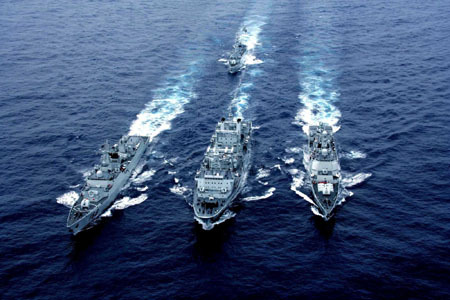IV-7 Question: There have been reports in recent years saying that China is "strengthening its air force, purchasing warships and submarines, rapidly developing its military strength, and could become a regional military giant, which might threaten some countries." What's your comment on these reports? What is China's stance on establishing a modern national defense? Will this create a military threat to other countries?
A: This report arbitrarily criticizes and accuses a sovereign country's normal national defense, which is very unreasonable. In recent years, China cautiously imported several types of modern airplanes and warships, and accelerated its studying and creating of new weaponry by itself with the precondition of increasing economic power. It has seen progresses in some areas such as the successful manufacture of the fighter plane J-10. However, the upgrade of a certain kind of military equipment cannot represent the growth of operational ability of the entire weaponry system, especially a real advancing in the IT-based combat operation. Therefore, even many military experts outside China suggested that Chinese military equipment is behind Western developed countries by at least 20 years.
It is the demand of modern national defense that an army should get used to operations under an informationalized condition. To get onto this track, the Chinese army must be retrained and reequipped, which requires a tremendous investment. Besides, the reality shows that Chinese military equipment neither exceeds the country's demands on national defense, nor does it exceed the country's economic and social development. Moreover, China is the only big country in the world that has not fulfilled the cause of national unification yet. Some Western countries have created the "China Threat" theory in excuses of China's military development and improvement of its weaponry equipment. The theory not only betrays the truth, but also distorts China's peaceful development environment.
China takes the national defense strategy of active defense, which is based on a military cultural tradition featuring "loving for peace, emphasizing defense and pursuit of a national unification." A country's military power tells only what it has, but not what it will do. It is its cultural tradition, administration theory, foreign policy and military strategy that decides if a country prefers military expansion or threatens other countries.
Never seeking hegemony is China's established state strategy, and the Chinese Government has augustly promised to the international community that it will not be the first to use nuclear weapons. China's developing modern national defense and introducing new military equipment are intent to maintain self-defense and the country's safe sovereignty, and protect the country's interests on land, in air and at sea. We will not invade or threaten any country.

(China.org.cn)